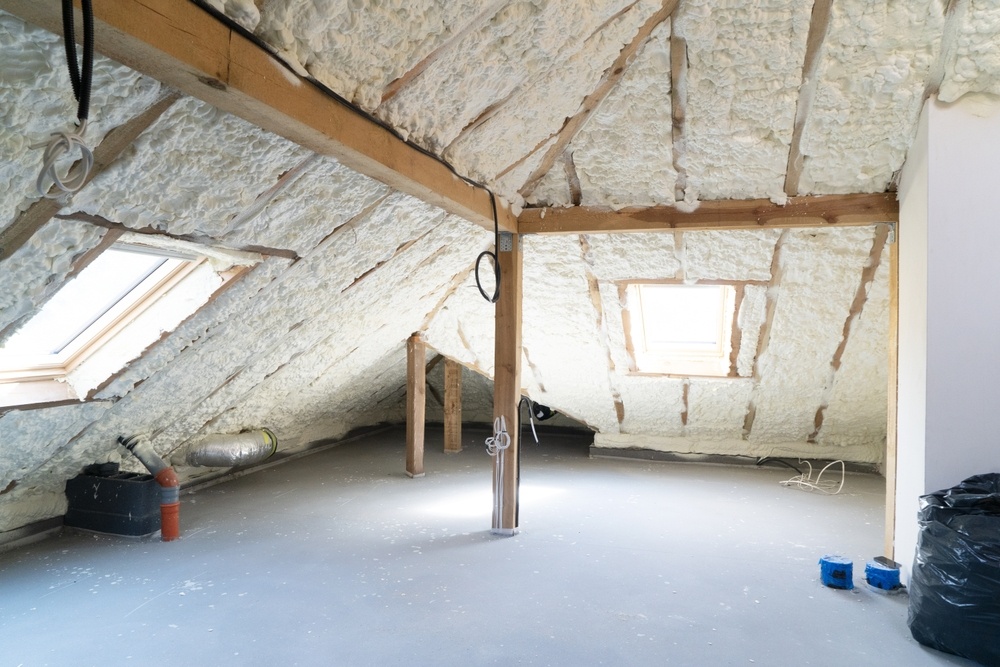Attic insulation plays a critical role in your home’s energy efficiency and comfort. In fact, it could be to blame for any drafts you feel in the winter, a hot and stuffy home in the summer, or energy bills that seem to climb higher every season. Without proper insulation, your home can lose significant heat in the winter and allow unwanted heat infiltration in the summer, leading to uneven temperatures, higher energy bills, and even ice dams during freezing months.
So, what is the best type of insulation for the attic to prevent all of this energy loss in your home? At Home Efficiency Experts, we specialize in spray foam, blown-in cellulose, and rigid foam board insulation, all of which offer unique benefits depending on your home’s needs. In this blog, we’ll explore each option and explain why attic insulation is essential for every Long Island home.
Why Attic Insulation Is Important for Your Home
Attic insulation isn’t just about keeping your home warm in the winter. It serves as a thermal barrier that helps you stay comfortable and save money year-round. Here are some key reasons to invest in attic insulation:
- Stop Heat Loss in Winter: Heat will gravitate towards cooler temperatures. Without proper insulation, warm air from your heating system escapes up through the attic, leaving your living spaces colder and your furnace or boiler working overtime.
- Reduce Heat Infiltration in Summer: In hot months, the attic can become a heat trap under the sun, with temperatures soaring well above 100°F. Insulation prevents this heat from seeping into your home, reducing the load on your air conditioning system.
- Prevent Ice Dams: Ice dams form when warm air in your attic melts snow on the roof, which then refreezes at the eaves. Proper insulation helps regulate attic temperatures, preventing uneven melting and costly water damage.
- Eliminate Drafts and Stack Effect: Insulation stops air leaks that cause cold drafts and the “stack effect”, where rising warm air pulls in cooler air from below, making your home feel drafty.
- Save on Energy Costs: A well-insulated attic reduces your reliance on heating and cooling systems, leading to lower energy bills throughout the year.
The Best Types of Attic Insulation
At Home Efficiency Experts, we use three primary types of insulation for attics: spray foam, blown-in cellulose, and rigid foam board. Each option has specific benefits that make it ideal for certain homes and situations.
1. Spray Foam Insulation
What it is: Spray foam insulation is a liquid that expands upon application to form an airtight, rigid layer of insulation. It’s one of the most effective insulation materials available for attics.
Benefits:
- Seals Air Leaks: Spray foam acts as both an insulator and an air sealant, closing gaps, cracks, and crevices where air can escape.
- High R-Value and Thermal Performance: Spray foam has a high R-value per inch, meaning it offers superior thermal resistance with less material.
- Moisture Control: It helps prevent moisture infiltration, which can lead to mold growth or damage in the attic.
Best For: Homes with significant air leaks, hard-to-insulate attic spaces, and homeowners looking for the most long-lasting, energy-efficient solution.
2. Blown-In Cellulose Insulation
What it is: Blown-in cellulose insulation is made from recycled plant fibers (often newspaper) treated for fire and pest resistance. It is applied using a blower, which distributes the material evenly across the attic floor.
Benefits:
- Eco-Friendly: Made from recycled materials, cellulose is a sustainable choice for homeowners.
- Dense Coverage: Cellulose fills gaps and voids, improving coverage over uneven attic floors.
Best For: Attic floors that have space for dense, consistent coverage to reduce heat loss and improve energy efficiency without breaking the bank.
3. Rigid Foam Board Insulation
What it is: Rigid foam board insulation consists of large, dense panels of foam that provide continuous insulation. It’s often used for attics with sloped ceilings or as a thermal barrier in unfinished attic spaces.
Benefits:
- High Insulating Value: Like spray foam, rigid foam has a high R-value per inch, offering excellent thermal resistance.
- Durable and Long-Lasting: Rigid foam boards are resistant to moisture and provide long-term performance.
- Versatile: They can be used on attic floors, walls, and ceilings for consistent insulation coverage.
Best For: Homes with unfinished attics, sloped ceilings, or where a durable insulation solution is needed.
Attic Insulation Is Not Always a DIY Project
While attic insulation may seem like a straightforward project, it’s best handled by professional insulation experts for several reasons:
- You Get a Proper Assessment: Professionals conduct a thorough energy assessment to identify air leaks, moisture issues, and the best insulation solution for your home.
- No Safety Concerns: Working in attics can be hazardous due to fall risks, exposure to insulation materials, and tight spaces.
- Correct Installation: Improperly installed insulation can leave gaps, reduce performance, and even cause moisture problems. Experts ensure a complete, airtight installation.
- Building Science-Based Work: Professionals understand how insulation works with your home’s ventilation and HVAC systems to prevent problems like moisture buildup or indoor air quality issues.
Upgrade Your Attic with Home Efficiency Experts
If you’re dealing with uneven temperatures, high energy bills, or ice dams, upgrading your attic insulation is the solution you need. Not sure where to start? Schedule a free energy assessment to find out how your attic can be improved. Our building science experts will identify problem areas, recommend the best insulation solution, and ensure professional, high-quality installation.
